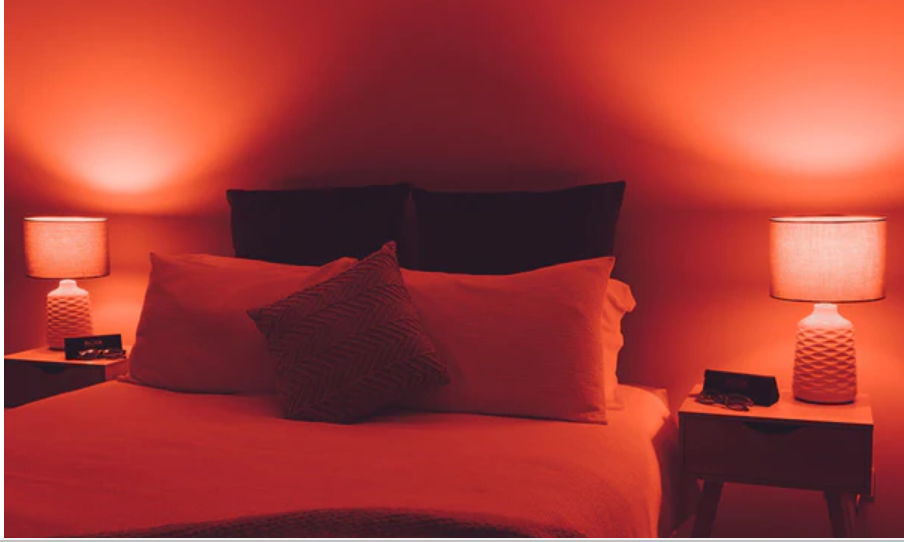
Red Light At Night Helps Your Sleep
Red Light At Night Helps Your Sleep
Red light has a milder impact on melatonin, making it a better choice before bedtime. Red light doesn't trick your body into thinking it's daytime, helping your brain signal that it's time to wind down. By reducing melatonin disruption, red light promotes a smoother transition to sleep.
So, swapping out harsh lights for softer red ones in the evening can signal your body that it's time to relax, fostering better sleep quality. Creating a calming environment with red lights may be a simple yet effective strategy for a restful night.
How Much Is Known About Red Light's Effects

The red light that messes with your sleep is the one that gives off red light waves. Regular light bulbs with a red tint might make your space cozy and lift your spirits, but they might not be great for red light therapy.
That means they will work differently to improve your sleep. Even though red-tinted bulbs are nice, they might not be the right kind of red light to help you sleep better. If you're looking for red light therapy to improve your sleep, you might need to use a different kind that specifically gives off those sleep-friendly wavelengths.
Red light For Better Sleep

Red light waves are thought to make your body produce melatonin. Melatonin is a natural hormone that helps you sleep.
When it gets dark, your brain makes more melatonin, but when there's light around, it makes less. The thought is that red light tells your brain to make more melatonin, which can help you sleep better.
The Impact of Red Light on Sleep Inertia
It's that chaotic feeling that sticks with you after you wake up. It can mess with your short-term memory, make you feel less alert, and affect how well you do things.
Red light through closed eyelids is not too bright to affect your sleep hormone (melatonin). It makes your groggy feeling after waking up easier to handle.
Night Vision And Red light

Super bright white light at night can be hard on your eyes; you might find yourself squinting and struggling to see. But red light is different; it doesn't dazzle or make you strain your eyes.
That's why they use red lights in airplane cockpits and submarines. Even astronomers and people who love looking at stars use red flashlights because they don't mess with your eyes in the dark. Red light makes it easier to see things at night without all the discomfort.
How To Identify The Best Light To Avoid At Night

Lights can mess with your body's natural sleep-wake rhythm more than others. However, any bright light, no matter the type, can disrupt your sleep. For example, blue light is cool during the day because it can boost your alertness.
But when it's nighttime, it can be a sleep spoiler. The blue light can mess with your brain and stop it from making melatonin, the sleepy hormone. So, during the day, blue light is your friend; at night, however, it might make it tough to fall asleep and stay snoozing.
Blue light waves are emitted from the sun, as well as from:
- Fluorescent lights
- LED lights
- Televisions
- Cell phones and tablets
- Computer screens
- Other electronic screens, like gaming devices
How To Use Light To Improve Your Sleep

Light is super important for how well you sleep because it messes with your internal clock, known as the circadian rhythm. This clock makes you feel sleepy when it's dark and wide awake when it's light. Light tells your brain what time it is. Normally, your circadian rhythm follows the natural pattern of sunrise and sunset.
But our world is full of artificial lights that can mess up this natural cycle. Some studies say that exposure to light at the wrong time can mess with your circadian rhythm and might not be great for your health. And when your internal clock is out of whack, you end up in a cycle where you can't sleep well at night and are super tired and craving naps during the day.
FAQ’s
Do red lights help you sleep?
Red light does something cool; it makes your body produce serotonin, a mood and sleep regulator. Plus, it helps tone down cortisol, a stress hormone that can mess with your sleep. Red light therapy isn't exactly like soaking in natural sunlight, but it can still do good things for your sleep.
Is red light a good color to sleep with?
Studies found that red light is the top choice for improving your sleep. It boosts melatonin production, creating a super dark vibe. Now, on the flip side, blue light is the least helpful. It's like red light is the sleep champion, while blue light is not the sleep buddy you want.
Does night light help you sleep?
Night lights can mess with melatonin, the hormone that helps you sleep. If the lights are super bright, they throw this hormone off balance and can mess up your sleep. But hold on; if the lights are dim, it's not a problem. Dim lights can even be good for your sleep.

Leave a comment